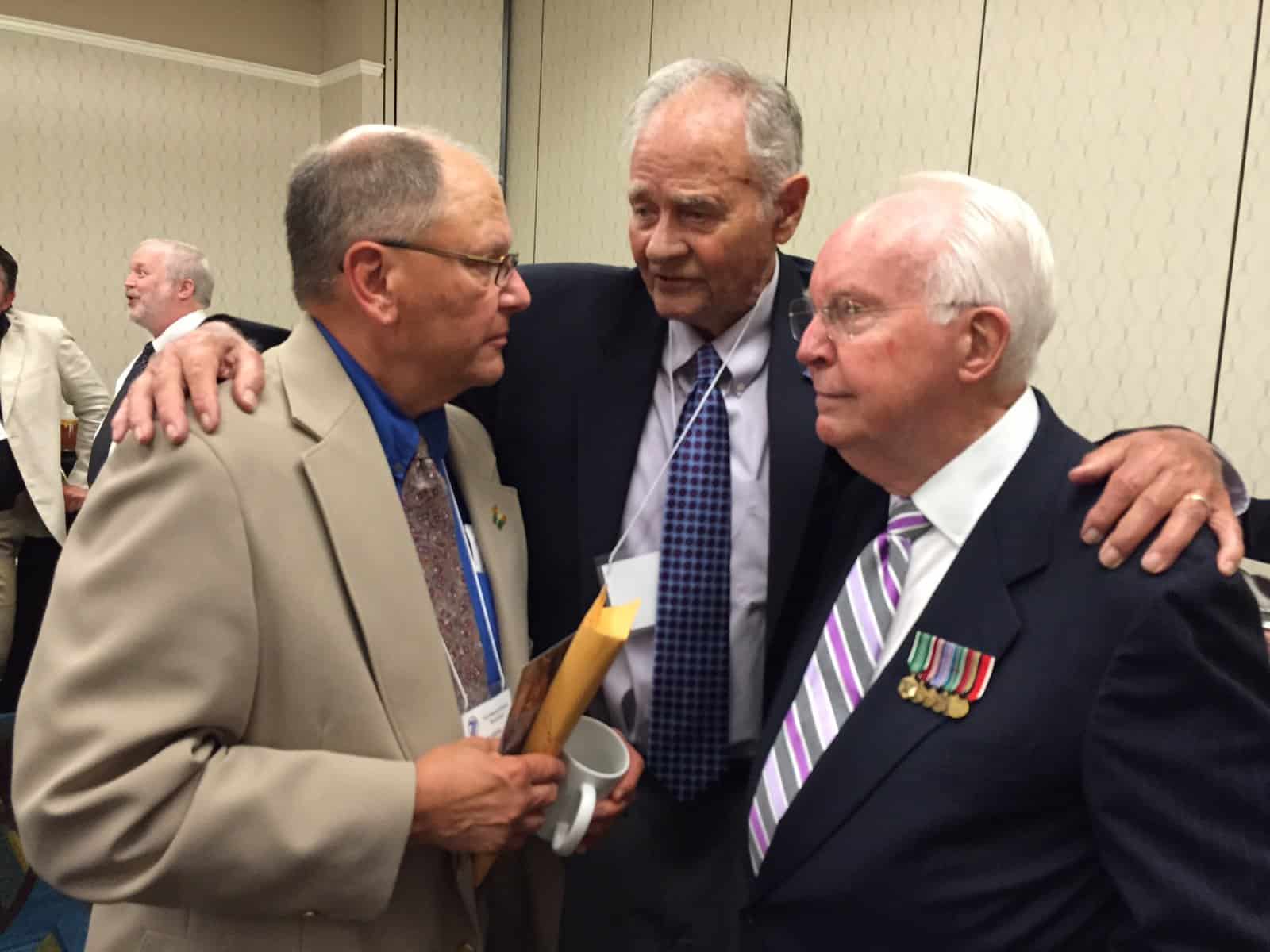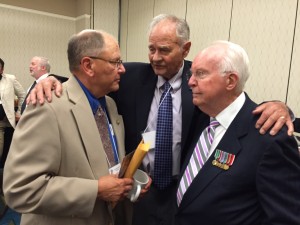The banquet room on the other side of the thin partition shook the walls with loud music. The relentless beat, the repeated, “sssslide to the left! [BOOM, BOOM]” practically drowned out the soft accented voice at the all but useless microphone.
But the droning drumbeat could not drown out the swelling feeling of pure goodness and humanity of the room I was honored to share with veterans of Patton’s 71st Infantry Division, and several survivors of Gunskirchen Lager, the Nazi death camp they liberated on May 4, 1945.
Let me back up a little bit. You may have read in this paper about Bill Jucksch, the Virginia Beach member of this group featured in the film Six Million and One, which played during the Jewish Film Festival in 2013. His sparkling crystal blue eyes and gentle demeanor belie the horrors he witnessed as a 19-year-old Army private when, while scouting for a position in the Austrian forest, he stumbled upon the gates of hell.
Jucksch’s unit had discovered Gunskirchen Lager, a satellite camp of the infamous Mauthausen, where in the waning days of the war, captives of the Nazis were left to die. But the soldiers of the 71st saved them. And while to their dismay they could not save them all, some of those they liberated made their way to the United States, and led extraordinary, “ordinary” lives.
The 71st Division stopped its active service in 1956, and thus its alumni pool is aging rapidly. But each year since 1986, the 71st Alumni Association has gathered together in one of the various hometowns of a (now) octogenarian host member, to remember the time that together they made history.
Jucksch hosted this event in 2008, but when no one else stepped up, he volunteered to host in Virginia Beach again this year. The weekend of the Oceana Air Show was the perfect time to showcase the respect and value this area places upon the military.
However, this was no ordinary veterans’ reunion.
Knowing it was going to be a fairly large gathering, I contacted the National World War II Museum in New Orleans, which is racing against time to collect oral histories of veterans. They sent Tommy Lofton, historian and curator, to Virginia Beach for a couple of days to try to get as many stories as possible, as well as contact information for those he would be unable to film in a short time. In his six years at the museum, he has visited almost 50 states and a dozen countries to collect testimony. I had one question for him: did he know of any other military alumni groups that welcomed and counted as full members of their associations the Holocaust survivors whom they had liberated, as the men of the 71st do? He had no knowledge of any other.
When Jucksch told me he was hosting this reunion, my first thought was that it would be too much for him to handle. My second thought was that I would finally get to meet some more of these people he has been telling me stories about for years. I’d had the chance to meet his jeep-mate from that fateful day 70 years ago, Pete Carnabucci, when we invited him here for the film festival and panel discussion. I had been lucky enough to accompany Bill and his wife Terry to the 20th Anniversary ceremonies of the United States Holocaust Memorial Museum in April 2013, where they introduced me to Gunskirchen survivor Simon Braitman and his wife Josephine. But the stories Jucksch told me made me want to meet more of these amazing people. Now I would have that chance.
There is no way to describe the feeling in that banquet room for the final event of the 2015 reunion. As has become their custom, many of the veterans and survivors had brought children and even grandchildren with them. While looking at the assembled dapper, grandfatherly gentlemen, it may be hard to believe that 70 years ago they literally saved more than 10,000 lives. (The exact number can’t be known, because at this point in the war, the usually meticulous Germans had given up record-keeping to flee for their own lives.) Even in wheelchairs and with some stooped backs, though, the heroes of the 71st Division stood taller than most people you will ever meet.
The love, reverence, and appreciation in the room were palpable as the night progressed. The feeling was that everyone in the room was “family.” To open the evening, an honor guard from Ft. Eustis presented the colors, including the flag of the 71st Infantry Division that matches the one that resides at the US Holocaust Memorial Museum. After dinner, Virginia Beach Councilman Jim Wood read a proclamation from Mayor Will Sessoms declaring September 19, 2015, 71st Infantry Day in the city. I was pleased to thank the 71st on behalf of the Holocaust Commission of the UJFT for their sacrifices and gift of preserving our freedoms.
Shortly thereafter, the soft spoken accented voice I mentioned earlier, Dr. Robert Fisch, took to the microphone. A survivor not only of Gunskirchen but also the Hungarian Communist regime, an award winning pediatrician, artist, and author of five books, Fisch was moved to share the six values that guide his life with the group. Though they were hard to hear that night over the noise next door, he later shared them with me in writing, noting that they can be found on the first page of his fourth illustrated book.
The value of compassion. From my Holocaust experience, I ask what those silent, slaughtered millions would ask of us now? Hatred and revenge—the very qualities that led to their demise? Not likely. I believe they would want us to have understanding, compassion, and love.
The value of equal treatment. A double standard is the biggest threat to civilization.
The value of children. Nothing is more important than the moral and intellectual education of our future generations.
The value of humor. I take humor seriously.
The value of suffering. Suffering has made me appreciate how precious life is. Hardship has made every minute, every slice of bread, more enjoyable and meaningful.
The value of remaining humane even in inhumane circumstances. Fisch has encapsulated the mission statement of the Holocaust Commission in his values. It was an honor to meet these men and their families, to share a moment with them 70 years, four months, and fifteen days after fate first brought the soldiers and survivors together.
Though each has led his life down different paths, this night they derived their strength from each other and their common bond. Fisch said of the group gathered in the room, “We are like threads in a carpet. The threads have no meaning without the carpet, and the carpet has no meaning without the threads.” A pretty profound observation from a man who was once a teenager left for dead by the Nazis.
by Elena Barr Baum


